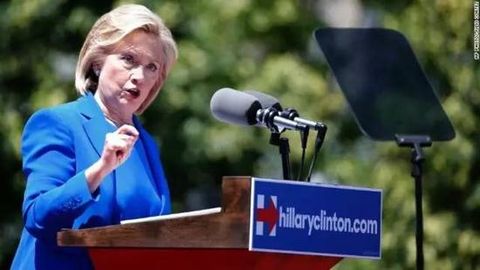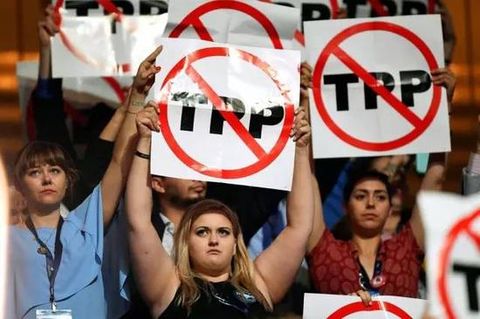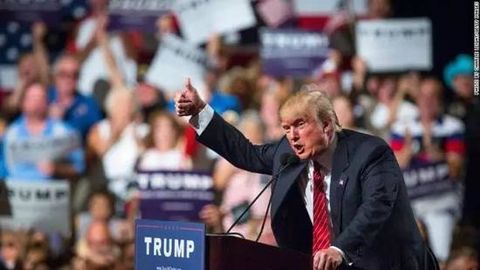What does Hillary’s election mean to the business world?
What does Hillary mean to the business world if he is elected? In this anti-globalization-led presidential election, although Hillary’s trade policy turned sharply left and strengthened her anti-Wall Street argument to highlight its seemingly firm leftist stance, the Democratic candidate still said that Business is the cornerstone of economic prosperity. One day before the presidential campaign four months ago, Hillary Clinton spent a lunch time with more than a dozen of the world's top economists and left-leaning policy makers in a conference room in downtown New York. The group, convened by former CEO of Laura Space Communications, Bernard Schwartz, shines, including former Federal Reserve Chairman Paul Volcker and former vice-president Alan Blinder, and Nobel laureate in economics. Joseph Stiglitz. They have a clear mission: to help the Democratic presidential candidate who is likely to be nominated in the party to develop a strategy to accelerate the recovery of the US economy. But the solution is not obvious. At that time, this recovery has lasted for five years, and although it has gained a firm foothold, it has also exposed some fundamental flaws. Corporate profits and the stock market soared again, but wages remained stagnant, which exacerbated widespread frustration and dissatisfaction: it was only those wealthy people who were at the top of the pyramid to witness the good days. After some deliberation, these heavyweight consultants agreed that the next US president should focus on such initiatives: spending huge sums of money to revitalize the aging infrastructure; strengthening the federal government's support for research and development; reducing the red tape faced by SMEs Encourage enterprises to develop employee skills training. These recommendations are all focused on driving economic growth. It is also worth noting that they did not focus on the redistribution of wealth, the so-called "fairness" issue. Hillary seems to be convinced. “Obviously, she is very inclined to create an economy based on investment and growth,†Schwartz said. But if Hillary's instinct pushes her to a market-friendly plan, the voters are pushing her in the other direction. The primaries of the two parties quickly revealed the general dislike of the general public against the establishments and the consensus-oriented economic prescription. Republican voters abandoned a large number of senior politicians and favored Donald Trump, who was an outsider. As Hillary’s main primary opponent, Senator Bernie Sanders’s economic proposition is highly sought after. The Vermont socialist promised to implement a massive wealth transfer program. Hillary, a model of the founding party, faces the danger of being stuck in a rapidly evaporating middle school route. However, she has long demonstrated her adaptability to this call for change. Last summer, Hillary called on the United States to build a “growth and fair economy†in a speech on economic issues. She said, “Growth and fairness are indispensable.†This speech agreed with its economic advisory team. The growth proposal is perfectly integrated with some liberal priority issues. The latter includes a substantial increase in minimum wage standards, an expansion of childcare services, and the sharing of corporate profits by workers. She also made extensive criticism of corporate short-termism. Hillary claims that many US companies often trade for quick returns at the expense of long-term value. Since then, Hillary has been carefully walking on a subtle and tortuous economic route. The presidential candidate, who is a pragmatic progressiveist, calls for rewriting economic rules, while not forgetting to celebrate some of the tried and tested economic concepts. In a speech nominated by the party, Hillary promised to tax "Wall Street, the company and the super rich." She declared that “American companies that have received so much benefit from our country should be patriotic and give back to the country. Many companies have done this, but there are still too many companies that have not done this.†However, her pro business Supporters are paying more attention to another paragraph: "After becoming president, my main mission is to create more opportunities for the United States and more work." "At the Democratic National Convention, when Bernie Sanders was sitting downstairs, Hillary did not mention income inequality or dismantle the current US economic system. She emphasized the creation of more job opportunities and increased Income. This is a typical middle school economics.†Jonathan Cowan, president of the Middle Left think tank Third Way, commented on Hillary’s speech. As Hillary and Trump's campaigns become more intense, many corporate leaders and other voters are asking the same question: Which candidate is better for the business? Frankly speaking, given that Hillary has lived in the spotlight for a quarter of a century, business leaders have known her better than any other presidential candidate in modern history. However, this election has repeatedly overturned people's expectations. Nowadays, it is difficult for outsiders to judge the true thinking of the two candidates, especially Hillary, who is known for its opacity. Fortune magazine interviewed dozens of industry leaders, political observers and economists to explore what it means to be a US business and economy. The survey concluded that although Hillary continued to adjust her policy proposition to demonstrate her seemingly firm leftist stance, the Democratic candidate still firmly believes that business is the cornerstone of economic prosperity. In this election, many industries that usually provide campaign funds for Republican candidates have turned to the Hillary camp. This one-sided donation may show who the company leaders want to win the election and who they think will be the winner. But Hillary’s huge support from the business community is a very telling issue. Many CEOs and Republican celebrities who endorse Hillary, initially worried that Trump won the election, but Hillary’s economic policy then resonated with them. "I think she really likes the business," said Hewlett-Packard CEO Meg Whitman. “She understands the role we play. In general, she tends to see that we are part of the solution, not part of the problem.†The election day is coming soon. If Hillary wins, she will begin a number of important appointments for the new government before she is sworn in. The left believes that this move will test her determination to commit to change. In their view, if Hillary chooses too many people from Wall Street, it means she will abandon the liberal business. She must then carefully lead a debate around the Trans-Pacific Partnership Agreement (TPP). During her tenure as Secretary of State, she helped launch the trade agreement involving 12 countries, but during the campaign, in the face of the surging wave of anti-free trade, Hillary had to take an opposition. In addition, according to informed sources, after entering the White House, Hillary will be vigorous and popular, and promote various legislation, including issues such as her tax and expenditure plans, immigration policy reform, and a plan to expand social welfare. In this regard, business leaders have every reason to believe that although Hillary will show her as a leftist, she will be a wise operator and even a true ally of the business community. According to insiders, at the beginning of his tenure, Hillary will first urge Congress to approve a large-scale investment plan aimed at repairing the crumbling infrastructure of the United States. She has referred to the state of disrepair in American roads, bridges, airports and railways as a "national emergency." According to the Foreign Relations Committee, the global ranking of US infrastructure quality has fallen from 5th in 2002 to 16th last year. Hillary Clinton called for $275 billion in this area within five years, most of which will be spent directly on transportation and other projects, and another $25 billion will enrich the capital of an infrastructure bank that will provide private builders with Loans and guarantees. Repairing broken roads and bridges is only part of the goal; this infrastructure spending will also provide construction work and drive faster economic growth. However, the Republican Party will never automatically support a spending plan of up to 12 digits. In order to gain support from opponents, Hillary has hinted that she is willing to make concessions on the simplification of corporate tax law. Her old colleague, New York State Senator Chuck Schumer, began negotiations with the Republican Party on this package deal this spring. The details of the deal are unknown. But as a central part of the plan, the new government will use a preferential tax rate as a bait to force US companies to hoard 2 trillion US dollars of profits overseas to return to the country. This tax revenue alone is enough to pay for infrastructure spending. However, policy makers cannot stop here. In order to prevent enterprises of all sizes from "rioting", they must also solve the rest of the tax law Rubik's Cube. Large enterprises that do not have overseas profits will require a full reduction in corporate income tax rates. Small businesses that pay taxes in their personal capacity will also ask the government to reduce their tax burden. Even if Hillary can manage to meet all of these competing commercial interests, the tax exemption policy at the core of the transaction is bound to cause dissatisfaction with liberals. They will almost certainly believe that this “big gift†to a few wealthy multinational companies is unacceptable. Danny Silvers, director of AFL-CIO policy at the American Labor Union, points out that by terminating the ability of these companies to delay paying offshore income tax, they can raise more than $500 billion to "pay for our infrastructure." Although Hillary has not yet explained how she will respond to the requirement to revisit the corporate tax law, she has made it clear that she hopes the tax law will have both "carrot" and "big stick" functions. For example, in terms of rewards, she supports tax credits for companies that hire apprentices and share profits with workers. She suggested canceling the capital gains tax for small business shareholders over five years. In terms of suppression, she will force companies that have moved their corporate headquarters overseas to pay an “exit tax†on their overseas income to combat tax inversion. She also called for a loophole in tax laws that would allow multinational companies to transfer profits to low-tax jurisdictions. In terms of Wall Street reform, the Democratic presidential candidate has proposed a reform plan aimed at strictly controlling the financial industry she once represented in the Senate. Its wish list includes the reinforcement of the “Volcker Rule†– a rule designed to prohibit large banks from using taxpayer deposits for venture capital; new reporting requirements for private equity firms and hedge funds; and prosecution of company executives for misbehavior . During the primary election, the left attack Hillary seems to be more interested in protecting the Goldman Sachs Group's revenue, not the public interest. But her Wall Street agenda has won praise from reform advocates. Dennis Kelleher, president of the non-profit organization Better Markets, pointed out that she is working hard to restore the terms of the derivatives transaction, which fully demonstrates her determination to transform Wall Street. “She seems to be planning to supervise big banks and shadow banking systems in a very radical way,†he said. Despite this, Wall Street people continue to pay for Hillary’s campaign. One explanation is that, unlike Trump, financiers can at least expect Hillary to be a firm leader who will not upset the market. “The market really punishes unpredictability,†said Jim Moline, CEO of MGM International. “Unpredictability is disturbing, and it creates a huge valuation gap.†Another industry source close to Hillary’s campaign team said, “She understands the importance of capital markets and the importance of the work we do.†At the same time, there is one more thing that makes the business community angry and frustrated, that is over-regulation. In the first seven years of his tenure, President Obama posted a record 392 rules with significant economic impact. In order to win the trust of the business community (not to mention the Republicans), Hillary must demonstrate some restraint in its regulatory policies. In August, she hinted that she might do this – to a certain extent. Hillary Clinton then called for the relaxation of the rules of community banks and credit unions to increase the available capital of small businesses. Progressives are extra vigilant in this regard. Some leftist groups are carefully monitoring Hillary’s political appointments. According to statistics, the new president needs to fill up to 4,000 institutional and departmental positions. The battle slogan of these leftist groups is: “Personnel is policy.†This means that if the next government recruits the regulatory officials from the department they are going to supervise, even the best reform plan is doomed from the beginning. But people familiar with the matter said that Hillary could not succumb to this pressure: she would eventually recruit a group of her favorite officials. During her tenure as Secretary of State, Hillary became one of the main advocates of the Obama administration in promoting the Trans-Pacific Partnership Agreement. This ambitious trade agreement aims to closely intertwin the Pacific Coast market, which accounts for 40% of global economic activity. In addition to creating new opportunities for US exporters, the agreement also attempts to curb China's influence in its own backyard. In her 2014 book Hard Choice, Hillary wrote that “TPP will connect markets across Asia and the Americas, reduce trade barriers, and raise labor, environmental and intellectual property standards.†In addition, she also called it To be "a strategic move to strengthen the US's position in Asia." This enthusiasm did not last long. In October last year, with the strong opposition to TPP's primary rival Sanders, Hillary announced that the final version of the agreement did not meet her standards, and she began to stand against it. She declared in August that "I will oppose the TPP, whether it is now, after the election, or after the president." But the business leaders who supported her did not believe it. "She is an internationalist in her heart," said Ron Kinder, chairman of the New Democracy Coalition, which supports trade. Hewlett-Packard CEO Whitman added, "Maybe she will try to restart the TPP negotiations to solve some of the things she thinks are not perfect. I don't think she is fundamentally opposed to free trade." To commit to economic growth, Hillary can't oppose free trade; but as a candidate who wants to win a presidential election dominated by anti-globalization, she has to oppose free trade. For those business-conscious voters, the ultimate question is whether Hillary can balance these two considerations and achieve success. Translator: Kevin Source: Fortune Chinese Network Enter [Sina Finance and Economics Unit] Discussion Shenzhen Yi Ding Peng Packaging Design Co., Ltd. , https://www.szydppackages.com
 Hillary sometimes publishes comments that are unfavourable to the business community.
Hillary sometimes publishes comments that are unfavourable to the business community.  The public is protesting against the TPP
The public is protesting against the TPP  Wall Street believes that Trump may bring confusion to the financial market.
Wall Street believes that Trump may bring confusion to the financial market.
